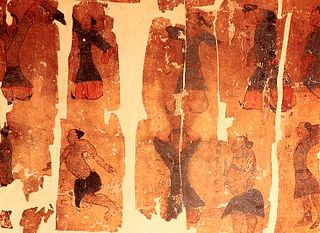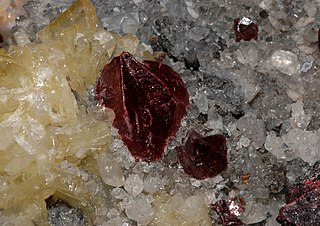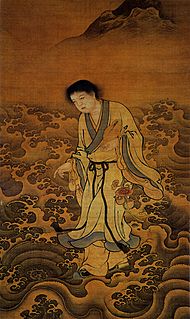Golden Elixir Press is an independent publisher of books and occasional papers on Taoism and Taoist Internal Alchemy (Neidan). The press was founded in 2009. As of March 2019, it had published about two dozen works, some of which are concerned with other traditions, such as Hinduism, Buddhism, and Sufism. [1]
According to an interview with the press founder, originally published in the Silent Tao website, the intended audience of Golden Elixir Press is "everyone who is interested for any reason in the doctrines of the Way of the Golden Elixir". [2] Although the books published by the press are mainly addressed to the general public, they have also been well-received by the academic community. [3] [4]
Publications of Golden Elixir Press include translations of some of the main texts of Taoist Internal Alchemy: the Cantong qi (Seal of the Unity of the Three), [5] the Wuzhen pian (Awakening to Reality), [6] and the Yinfu jing (Book of the Hidden Agreement). [7]
The press is closely related to Fabrizio Pregadio, a scholar who, in addition to his academic research, publishes translations of original Chinese texts addressed to a wider audience. [8]

Tao yin, also called Taoist Neigong, is a series of body and mind unity exercises practiced by Taoists to cultivate Jing (essence) and direct and refine qi, the internal energy of the body according to Traditional Chinese medicine. The practice of Tao Yin was a precursor of qigong, and was practised in Chinese Taoist monasteries for health and spiritual cultivation. Tao Yin is also said to be a primary formative ingredient in the well-known "soft style" Chinese martial art, T'ai Chi Ch'uan.
Dantian, dan t'ian, dan tien or tan t'ien is loosely translated as "elixir field", "sea of qi", or simply "energy center". Dantian are the "qi focus flow centers", important focal points for meditative and exercise techniques such as qigong, martial arts such as t'ai chi ch'uan, and in traditional Chinese medicine.
The Three Treasures or Three Jewels are theoretical cornerstones in traditional Chinese medicine and practices such as Neidan, Qigong, and T'ai chi. They are also known as Jing Qi Shen. Despeux summarizes.
Jing, qi, and shen are three of the main notions shared by Taoism and Chinese culture alike. They are often referred to as the Three Treasures, an expression that immediately reveals their importance and the close connection among them. The ideas and practices associated with each term, and with the three terms as a whole, are complex and vary considerably in different contexts and historical periods. (2008:562)

Chinese alchemy is an ancient Chinese scientific and technological approach to alchemy, a part of the larger tradition of Taoist body-spirit cultivation developed from the traditional Chinese understanding of medicine and the body. According to original texts such as the Cantong qi, the body is understood as the focus of cosmological processes summarized in the five agents, or wu xing, the observation and cultivation of which leads the practitioner into greater alignment with the operation of the Tao, the great cosmological principle of everything. Therefore, the traditional view in China is that alchemy focuses mainly on the purification of one's spirit and body in the hopes of gaining immortality through the practice of Qigong and/or consumption and use of various concoctions known as alchemical medicines or elixirs, each of which having different purposes.

Neidan, or internal alchemy, is an array of esoteric doctrines and physical, mental, and spiritual practices that Taoist initiates use to prolong life and create an immortal spiritual body that would survive after death. Also known as Jindan, inner alchemy combines theories derived from external alchemy, correlative cosmology, the emblems of the Yijing, and medical theory, with techniques of Daoist meditation, daoyin gymnastics, and sexual hygiene.
The Cantong qi is deemed to be the earliest book on alchemy in China. The title has been variously translated as Kinship of the Three, Akinness of the Three, Triplex Unity, The Seal of the Unity of the Three, and in several other ways. The full title of the text is Zhouyi cantong qi, which can be translated as, for example, The Kinship of the Three, in Accordance with the Book of Changes.
The Huangdi Yinfujing, or Yinfujing, is a circa 8th century CE Daoist scripture associated with Chinese astrology and Neidan-style Internal alchemy. In addition, Huangdi Yinfujing is also the name of a Chinese Fengshui text on military strategy.
The Wuzhen pian is a 1075 Daoist classic on Neidan-style internal alchemy. Its author Zhang Boduan was a Song dynasty scholar of the Three teachings.

Ge Xuan (164–244), courtesy name Xiaoxian, was a Chinese Taoist who lived in the Eastern Han dynasty (25–220) and Three Kingdoms period (220–280) of China. He was the ancestor of Ge Hong and a resident of Danyang Commandery in the state of Eastern Wu during the Three Kingdoms period. Ge Xuan's paternal grandnephew, Ge Hong, gave him the title "Ge Xuan Gong", which translates into "Immortal Lord" or "Transcendent Duke". Ge Hong wrote at length about his great uncle, and claimed that some alchemical texts from the Baopuzi originally came from him. Ge Xuan is also portrayed by his descendant Ge Chaofu as having been the first recipient of the Lingbao scriptures. He is remembered as a mythological member of the Chinese Ge family and a prominent figure in the development of early Chinese Daoism.
The Xiuzhen tu is a Daoist diagram of the human body illustrating principles of Neidan 內丹 "Internal alchemy", Chinese astrology, and cosmology.

The Neijing Tu is a Daoist "inner landscape" diagram of the human body illustrating Neidan "Internal alchemy", Wu Xing, Yin and Yang, and Chinese mythology.
There is significant scholarly debate about the Taoist understanding of death. The process of death itself is described as shijie or "release from the corpse", but what happens after is described variously as transformation, immortality or ascension to heaven. For example, the Yellow Emperor was said to have ascended directly to heaven in plain sight, while the thaumaturge Ye Fashan was said to have transformed into a sword and then into a column of smoke which rose to heaven.

The Baopuzi, written by the Jin dynasty scholar Ge Hong 葛洪 in 283-343, is divided into esoteric Neipian 內篇 "Inner Chapters" and equally exoteric Waipian 外篇 "Outer Chapters". The Taoist Inner Chapters discuss topics such as techniques to achieve "hsien" 仙, Chinese alchemy, elixirs, and demonology. The Confucian Outer Chapters discuss Chinese literature, Legalism, politics, and society.

The Yellow Court Classic, a Chinese Taoist meditation text, was received from the unknown source by Lady Wei Huacun, one of the founders of Highest Purity Tradition, in the 288 CE. The first reference to the text appears in the archives of the famous alchemist and collector of Taoist texts, Ge Hong (葛洪) in the 4th century CE.

Waidan, translated as external alchemy or external elixir, is the early branch of Chinese alchemy that focuses upon compounding elixirs of immortality by heating minerals, metals, and other natural substances in a luted crucible. The later branch of esoteric neidan "inner alchemy", which borrowed doctrines and vocabulary from exoteric waidan, is based on allegorically producing elixirs within the practitioner's body, through Daoist meditation, diet, and physiological practices. The practice of waidan external alchemy originated in the early Han dynasty, grew in popularity until the Tang (618–907) when neidan began and several emperors died from alchemical elixir poisoning, and gradually declined until the Ming dynasty (1368–1644).

Liu Yiming (1734–1821) was a Chinese ophthalmologist and philosopher who was one of the main representatives of Taoist Internal Alchemy, or Neidan. He was an 11th-generation master of one of the northern branches of the Longmen 龍門 lineage, and the author of a large number of works that illustrate his views on both Taoism and Neidan.
Fabrizio Pregadio is a Sinologist and a translator of Chinese language texts into English related to Taoism and Neidan. He is currently affiliated with the International Consortium for Research in the Humanities. Earlier, Pregadio taught at the University of Venice (1996–97), the Technical University of Berlin (1998-2001), Stanford University (2001–08), McGill University in Montreal (2009–10), and the University of Erlangen-Nuremberg (2014-18).

Liu Haichan (劉海蟾) was a Daoist xian "transcendent; immortal" who is a patriarch of the Quanzhen School, and a master of neidan "internal alchemy" techniques. Liu Haichan is associated with other Daoist transcendents, especially Zhongli Quan and Lü Dongbin, two of the Eight Immortals. Traditional Chinese and Japanese art frequently represented Liu with a string of square-holed cash coins and a mythical three-legged chánchú (蟾蜍) "toad; toad in the moon". In the present day, it is called the jīnchán (金蟾) "Money Toad", and Liu Haichan is considered an embodiment of Caishen "God of Wealth".

In Chinese alchemy, elixir poisoning refers to the toxic effects from elixirs of immortality that contained metals and minerals such as mercury and arsenic. The official Twenty-Four Histories record numerous Chinese emperors, nobles, and officials who died from taking elixirs in order to prolong their lifespans. The first emperor to die from elixir poisoning was likely Qin Shi Huang and the last was Yongzheng. Despite common knowledge that immortality potions could be deadly, fangshi and Daoist alchemists continued the elixir-making practice for two millennia.

The Chinese term zhī (芝) commonly means "fungi; mushroom", best exemplified by the medicinal Lingzhi mushroom, but in Daoism it referred to a class of supernatural plant, animal, and mineral substances that were said to confer instantaneous xian immortality when ingested. In the absence of a semantically better English word, scholars have translated the wide-ranging meaning of zhi as "excrescences", "exudations", and "cryptogams".











